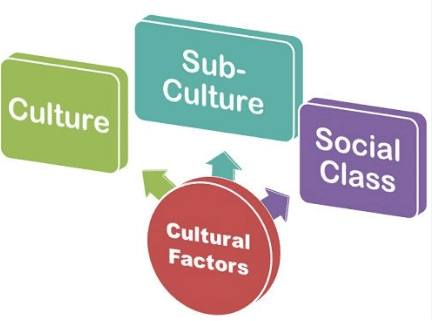Socio-Cultural Factors and it's Influence on Business | Crash Course for UGC NET Commerce PDF Download
| Table of contents |

|
| Sociocultural Environment |

|
| Importance of the Sociocultural Environment for Businesses |

|
| Key Sociocultural Factors |

|
| Impact on Businesses |

|
| Case Studies |

|
Sociocultural Environment

The sociocultural environment refers to the collective attitudes, behaviors, and values that permeate a society. These elements evolve continually as a result of shifts in population, lifestyles, cultures, and traditions. They represent the shared customs and practices that shape society and are often passed down through generations.
Demographics are closely tied to sociocultural factors and encompass the composition of a population, including characteristics such as gender, age, ethnicity, race, language, education level, occupation, income, family size, and religion. Understanding both demographics and the sociocultural environment—often referred to collectively as sociodemographic factors—provides businesses with valuable insights into consumer behavior.
The sociocultural environment is dynamic, constantly changing due to factors like birth rates, death rates, and immigration patterns. These demographic shifts, along with evolving social values and customs, can present both opportunities and challenges for businesses. Companies that effectively monitor and analyze sociocultural trends can develop strategies to capitalize on new market opportunities while mitigating potential risks.
Importance of the Sociocultural Environment for Businesses
Understanding the sociocultural environment enables businesses to make strategic decisions, identify promising markets, and develop products and services that resonate with their target audiences. This proactive approach helps companies navigate the changing landscape and achieve sustainable growth in the long term.
The sociocultural environment influences several key areas critical to a company's success:
Market Targeting and Segmentation Sociocultural factors provide essential insights into consumer behavior, preferences, and values, allowing businesses to segment their target audience effectively. By understanding the demographics (such as age, income, education) and cultural nuances (such as attitudes, lifestyles) of different groups, companies can tailor their marketing messages and product offerings to resonate with specific segments. This targeted approach results in more efficient marketing spending and increased campaign effectiveness.
Future Growth Potential When considering international expansion, analyzing the sociocultural environment of potential markets is crucial. Demographics such as population size, age structure, and workforce composition can indicate a market’s growth potential. For example, targeting countries with a large working-age population can present significant opportunities for businesses looking to expand their customer base and tap into an available workforce.
Opportunities and Threats The dynamic sociocultural environment offers both opportunities and threats for businesses. Shifting consumer values, evolving lifestyles, and emerging social trends can disrupt traditional business models. Companies that can identify and adapt to these changes can unlock new market opportunities. For instance, the growing emphasis on sustainability has led to increased demand for eco-friendly products and services. Companies that adapt their offerings to cater to this segment can gain a competitive edge. Conversely, failing to recognize or address these sociocultural shifts can result in missed opportunities or even business decline.
Key Sociocultural Factors

The sociocultural environment is a complex web of interconnected factors that influence consumer behavior and business strategy. Some key variables to consider include:
Population
- Growth: A growing population offers a larger potential customer base for businesses. However, rapid population growth can also strain resources and infrastructure, leading to social unrest and affecting business stability.
- Age Composition: This significantly impacts consumer spending patterns. A large young population creates demand for education, housing, and starter goods, while a growing elderly population increases the demand for healthcare services and retirement products. Businesses can tailor their offerings and marketing strategies to cater to the dominant age groups within a specific market.
Family Structure Changes in family structures, such as the rise in single-parent households, dual-income families, and childless couples, influence consumer spending habits. Businesses that understand these shifting family dynamics can develop products and services that cater to the specific needs of these diverse family units.
Work and Social Class The rise of automation and the gig economy is transforming the traditional workforce. Businesses need to adapt to these changes by focusing on skills development and catering to the needs of a more flexible workforce. Additionally, social class plays a role in consumption patterns. Understanding the spending habits of different social classes allows businesses to develop targeted marketing campaigns and product offerings.
Geography and Ethnicity Consumer preferences and needs can vary significantly depending on geographic location. Urban populations tend to have different spending habits compared to rural communities. Additionally, ethnic and cultural backgrounds influence purchasing decisions. Businesses can leverage this knowledge to localize their marketing efforts and product offerings to resonate with specific geographic and ethnic demographics.
Culture, Habits, and Beliefs
- Cultural Values: Cultural values and traditions significantly impact consumer behavior. For example, the growing emphasis on environmental sustainability is driving demand for eco-friendly products. Businesses that align their offerings with these evolving cultural values can position themselves for long-term success.
- Consumer Habits: Habits and routines shape everyday purchasing decisions. Understanding these ingrained behaviors allows businesses to develop products and marketing strategies that seamlessly integrate into consumers’ lives.
- Belief Systems: Religious beliefs and ethical considerations can influence consumer choices. Businesses that demonstrate social responsibility and ethical practices can build trust and loyalty with consumers who share their values.
Impact on Businesses
The ever-evolving sociocultural environment presents both challenges and opportunities for businesses. Here’s how these trends can impact various aspects of a company:
- Market Demand and Strategy
- Shifting Consumer Preferences: Sociocultural changes directly influence consumer needs, wants, and purchasing behaviors. Companies that can identify these evolving preferences and adapt their product offerings and marketing strategies accordingly are more likely to capture market share and achieve sustainable success. For example, the growing health consciousness among consumers has led to increased demand for organic and healthy food options. Businesses that cater to this trend by offering healthy alternatives can gain a competitive edge.
- Generational Shifts: Different generations have distinct spending habits and priorities. Understanding these generational differences is crucial for businesses to develop targeted marketing strategies and product offerings. For instance, millennials, a tech-savvy generation, prioritize experiences and value convenience. Businesses that cater to this demographic by offering online shopping platforms and subscription services can attract their spending power.
- Aging Population: The rising global population of senior citizens presents both challenges and opportunities for businesses. As people age, their healthcare needs and spending patterns shift. Companies that develop products and services that cater to the specific needs of an aging population, such as senior living communities or health and wellness products, can tap into a growing market segment.
- Emerging Markets: Understanding sociocultural factors is crucial when evaluating potential new markets. A company’s target market’s demographics, cultural norms, and technological adoption rates all play a role in determining product suitability and marketing effectiveness. Analyzing the sociocultural environment of potential markets allows businesses to make informed decisions about international expansion and resource allocation.
Human Resources

Workforce Skills and Diversity: The evolving nature of work, driven by factors such as automation and globalization, necessitates a workforce that is skilled and adaptable. By understanding the changing skill sets required in the current sociocultural landscape, businesses can invest in employee training and development programs that promote adaptability and help future-proof their workforce.
Additionally, sociocultural trends like the increasing focus on diversity and inclusion compel companies to create inclusive work environments. Such environments not only attract talent from diverse backgrounds but also help retain it, ensuring a well-rounded and resilient workforce.
Competitive Landscape
Competitive Advantage: Companies that successfully navigate the sociocultural landscape gain a significant edge over their competitors. By understanding the changing needs and values of their target market, businesses can develop innovative products and services that resonate with consumers, setting themselves apart in the marketplace. For instance, companies that prioritize sustainability and ethical sourcing can appeal to environmentally conscious consumers, thereby establishing a competitive advantage.
Changing Consumer Values
Environmental Consciousness: The growing emphasis on environmental sustainability is a clear example of how sociocultural shifts influence consumer behavior. Investors seeking companies with long-term potential should focus on those committed to environmental responsibility. Businesses that adopt eco-friendly practices throughout their operations—from sourcing materials to packaging and recycling—connect with environmentally conscious consumers and position themselves for success in a market increasingly focused on sustainability.
Ethical Sourcing: Another key shift in consumer values is the rising demand for ethical sourcing practices. Consumers are increasingly concerned about the working conditions and environmental impact associated with the production of goods. Companies that prioritize ethical sourcing throughout their supply chains can build trust and loyalty with consumers who share these values. For example, businesses that source materials from fair-trade-certified producers and ensure fair wages and safe working conditions for their employees can differentiate themselves in the marketplace and attract investment from socially responsible investors.
Case Studies
Adapting to Online Shopping: The Rise of E-commerce The rise of e-commerce has dramatically changed consumer shopping habits. Brick-and-mortar retailers that fail to adapt to this shift risk losing market share to more agile competitors who capitalize on online channels. These competitors excel by providing seamless online shopping experiences, including user-friendly websites, mobile apps, efficient delivery options, and secure payment gateways.
Successful online retailers also invest in data analytics to understand customer behavior and personalize their marketing strategies. This data-driven approach allows them to target specific customer segments with relevant product recommendations and promotions, further boosting online sales.
Sustainability in Action: Unilever Unilever, a global consumer goods company, exemplifies how businesses can respond to the growing emphasis on environmental responsibility. By integrating sustainable practices throughout its supply chain and offering eco-friendly products, Unilever aligns itself with the values of environmentally conscious consumers. This commitment extends beyond just offering eco-friendly products; Unilever actively promotes sustainability initiatives, such as reducing its carbon footprint and minimizing plastic waste across its operations.
Additionally, Unilever invests in sustainable sourcing practices and collaborates with suppliers who share their commitment to environmental responsibility. These efforts not only benefit the environment but also resonate with consumers who increasingly make purchasing decisions based on a company’s social and environmental impact. This focus on sustainability fosters brand loyalty, positive word-of-mouth marketing, and, ultimately, long-term business success.
|
145 videos|236 docs|166 tests
|















